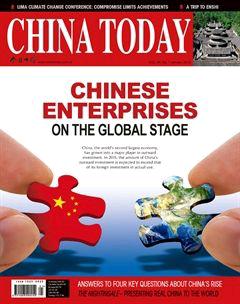Economy
ICBC Opens London Branch
The Industrial and Commercial Bank of China(ICBC) London Branch officially opened for business on December 1, 2014. It is the first bank branch from the Chinese mainland to open in the UK since 1949.
At the opening ceremony, ICBC Chairman Jiang Jianqing said that the bank has always valued the British market and regarded London as a core strategic facet of its overseas development.
ICBC London Branch and ICBC (London) plc, the existing local subsidiary of the bank, will primarily engage in traditional commercial banking, the former focusing on large wholesale business and the latter on retail and SME business, said Jiang.
According to Jiang, ICBCs transaction with Standard Bank Plc (SB Plc), through which ICBC will acquire a controlling interest in the UK-registered company, is underway. The deal is expected to improve ICBCs performance in global hedging, currency and capital markets. ICBC subsidiaries in Britain will then jointly build a financial service platform with a synchronized development strategy. This will improve ICBCs financial standing and give it a bigger role in economic and trade exchanges between China and the UK.
So far, ICBC has established over 330 overseas institutions in 41 countries and regions worldwide.
China To Establish National Brand Catalog for Agricultural Products
The Ministry of Agriculture(MOA) announced at a press conference on December 3, 2014 that China will establish a national brand catalog for agricultural products that will incorporate the most influential and valuable brands. In addition, a system will be set up to regularly update and dynamically manage the list. The move is aimed to promote development of Chinas agricultural brands.
Zhang Hecheng, director general of MOAs Department of Market and Economic Information, said at the press conference that branding is a key mark of agricultural modernization. Accelerating brand development is necessary to advance development of modern agriculture in China.
Statistics show that Chinas registered agricultural brands rose to 1.25 million in 2012 from 600,000 in 2008. However, China started late in brand building, so most domestic agricultural brands are not yet internationally competitive.
Won-Yuan Direct Trading Market Opens
A market to directly trade the currencies of South Korea and China, rather than brokering the two currencies with the U.S. dollar, opened in Seoul on December 1, 2014.
Before the new market opened, traders in the two currencies had to use the U.S. dollar as an intermediary currency. This doubled transaction costs and increased risks due to fluctuating exchange rates. Insiders indicate that won-yuan direct trading will reduce transaction costs and improve the RMBs liquidity in South Koreas market, thereby increasing the use of RMB in trade settlement.
South Korean citizens and enterprises have long been able to directly exchange won into RMB. However, banks have lacked a largescale won-yuan trading market, and had to trade the two currencies through third parties. South Koreas central bank has now picked 12 domestic and foreign banks as market makers for direct trading, including Shinhan Bank, Woori Bank, Citibank, and Chinas Bank of Communications.
China Introduces Deposit Insurance Scheme
Chinas central bank, the Peoples Bank of China (PBC), released a set of draft regulations on deposit insurance on November 30, 2014 soliciting public opinions. The regulations will be formally introduced in January 2015.
According to the draft regulations, the deposit insurance scheme will require financial institutions to pay insurance premiums into a special fund. It will pay maximum compensation of RMB 500,000 per depositor if a bank suffers insolvency or bankruptcy. The central bank will cap insurance coverage of RMB 500,000 on each clients deposits at each bank. Banks will cover losses of more than RMB 500,000 with their own assets.
According to the central bank survey of citizens deposits in 2013, the maximum coverage will give full protection to 99.6 percent of depositors in China. Moreover, the maximum coverage will not be fixed, but change with economic development, structural change of deposits, and financial risks. It will be adjusted by the central bank and the State Council.
The central bank indicated that the deposit insurance scheme would be significant in the following aspects: First, it will better protect depositors, effectively stabilize market expectations and increase public confidence in the banking system, thereby forming a market-responsive mechanism to prevent and defuse financial risks. Second, it will improve Chinas financial safety net via early detection and prevention of financial risks. Third, it will help create a fair environment for all financial institutions.
In addition, the scheme will significantly improve the competitiveness of medium-sized and small banks as the insurance will assure depositors of the safety of their savings.

